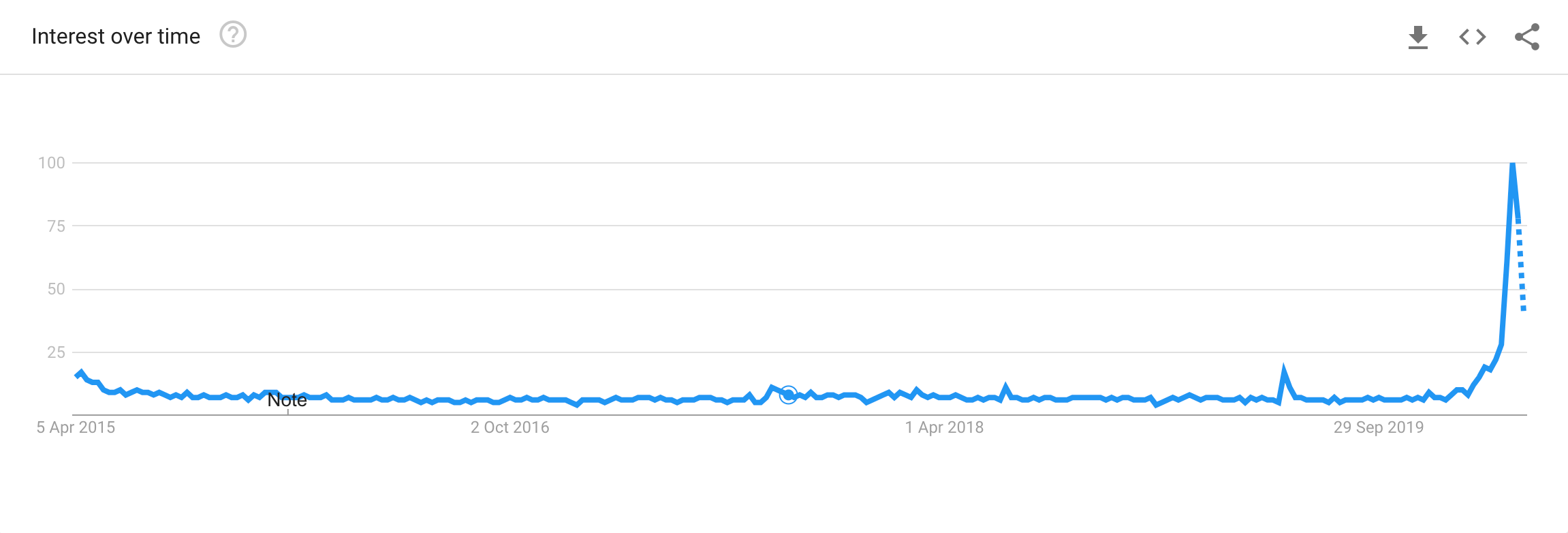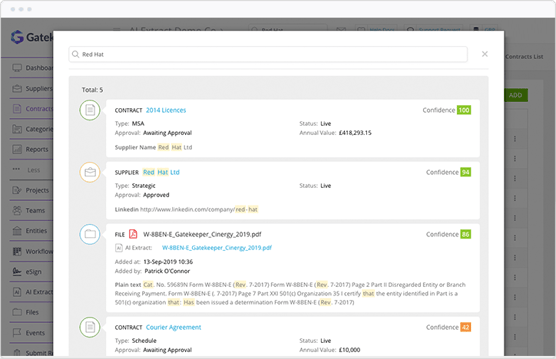Businesses are currently experiencing an unprecedented set of circumstances due to COVID-19. Lockdown and travel restrictions are severely limiting commerce options across the majority of sectors, meaning that supply and demand no longer match up. Many businesses have had to close their doors and – put simply – they won’t be able to fulfil their contractual obligations.
As a result, there’s been an explosion of interest and focus on force majeure over the last two weeks. See the graph below which tracks Google searches over the last 5 years for “force majeure” and note the massive spike beginning in March this year.
 This relatively “under-the-radar” clause is suddenly being scrutinised to a level not seen since the financial crisis of 2008.
This relatively “under-the-radar” clause is suddenly being scrutinised to a level not seen since the financial crisis of 2008.
Below, we break down some contract jargon by exploring what force majeure means, how it’s applied, and how Gatekeeper can help you to assess and manage any potential contract risks in these testing times.
What is force majeure?
Force majeure originates from the French language and directly translates to “superior force”. Often used as a contract clause, it refers to a list of circumstances or situations that may prevent parties from performing their contractual obligations. These circumstances must be unforeseen and beyond the control of the affected party.
Force majeure clauses protect businesses in the event of natural disasters or catastrophic events. These are literally superior forces of nature or, as viewed by some as, acts of God.
When to engage force majeure
It is not enough that circumstances are beyond the affected party’s control. The affected party must also demonstrate:
- Its ability to fulfil its obligations has been prevented, delayed or hindered directly by the event
- It has taken all possible steps to mitigate the event or its consequences
By triggering the force majeure clause, the affected party can remove liability and temporarily, or even permanently, suspend its contractual performance. Instead, parties will only be required to fulfil payment obligations. If the affected party is permanently released, you must ask yourself, what is the risk to your business in the short and long term?
Force majeure events
The wording of this clause is vital, as force majeure can only be invoked against explicitly named events within the contract. Events are most commonly built around catastrophes including wars, earthquakes, fires and floods. In other events, contractual obligations may be prevented by strikes, acts of state or governmental action and even riots.
The question in today’s climate, however, is whether or not force majeure can be engaged in the case of COVID-19. With countries in lockdown and non-essential businesses largely shut down, many suppliers will be unable to fulfil performance requirements and businesses will be feeling the pinch of poor performance.
However, while pandemics and epidemics can increase overall contract risk, unless they’re explicitly referenced in the relevant force majeure clause there could be some room for legal challenge.
What if a contract doesn’t include force majeure?
Today’s events highlight how crucial a force majeure clause is within any contract. When events are clearly defined, as are the processes for what happens if the events occur, all parties involved will understand the obligations that should and can’t be fulfilled.
If a contract doesn’t include a force majeure clause, or fails to explicitly name pandemics as an event and causes ambiguity, parties in some locations may be able to suspend their obligations through the doctrine of frustration.
In the event of COVID-19, for example, it may well become impossible for parties to perform. As a result, the contract becomes frustrated and can potentially be terminated for convenience – with all parties released from their obligations.
How a contract management platform can help
Most businesses will be tied into multiple contracts at any given time and so, during a global pandemic such as COVID-19, it’s important to be able to quickly assess and understand your contractual obligations, as well as your vendors’.
Gatekeeper’s Global Search function can help you to easily identify which contracts include a ‘force majeure’ clause. Our OCR engine will also help you to drill down into contract metadata and search for other relevant language such as ‘pandemic’.
 The Gatekeeper 'Find' Engine
The Gatekeeper 'Find' Engine
With our contract lifecycle management software, you can:
- Easily search your contracts and extract key information such as values, obligations, relevant dates and contact names
- Categorise and record business risks using our Risk Module
- Efficiently separate business-critical contracts to focus attention
- Drive down costs through the identification of wasted spend and consolidation opportunities
- Give your business a solid platform from which to grow once the threat from COVID-19 recedes
Through a combination of powerful search tools and advanced filtering functionality, Gatekeeper can help you to assess the risks of any force majeure, assign tasks and act straight away.
If you want to know more about how to manage your contracts during a time of crisis, or how our platform can help, please contact us today.
You can also refer to our COVID-19 Resource Centre, which contains a wealth of information and resources for both Gatekeeper customers and all other businesses looking to work through this crisis period.

















.png)
.png)
.png)
-4.png)